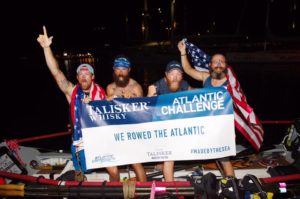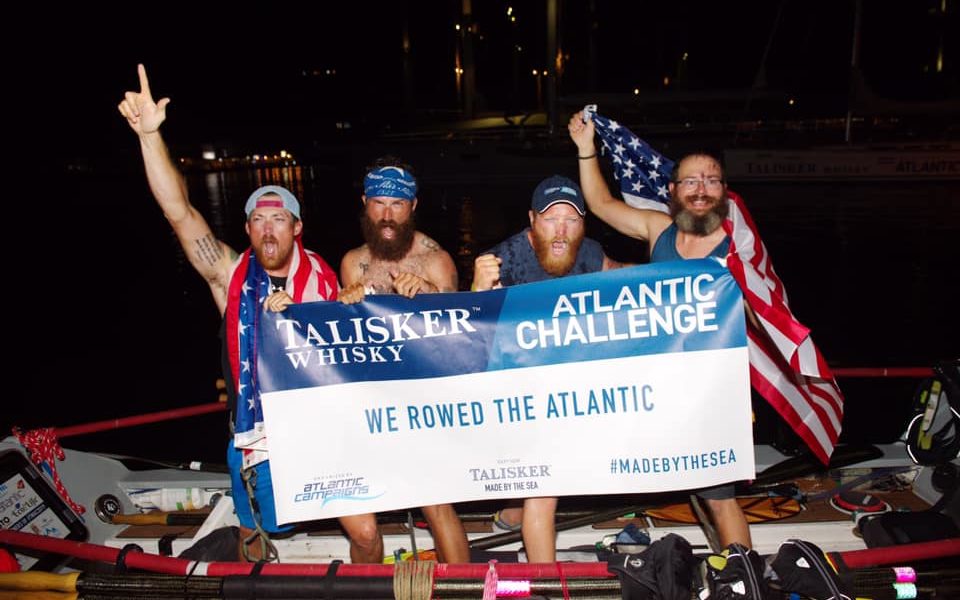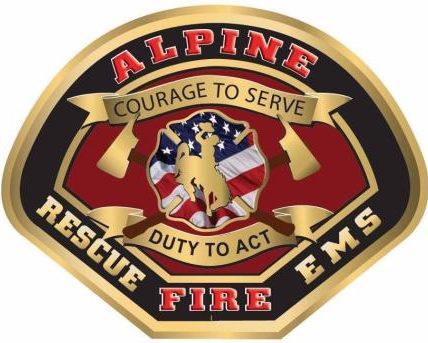By Mark Davis
Powell Tribune
Via- Wyoming News Exchange

POWELL — After rowing 3,000 miles across the Atlantic Ocean in a four-man boat, Powell resident Carl Christensen found it hard to believe it was finally over. The reality of being on dry land hadn’t set in yet.
“I don’t know where I’m at,” he said on the pier Friday after dark. “I think I’m in Antigua.”
Yet Christensen knew what he and his team had accomplished. He stated it simply while being cheered on the podium after the historic finish: “I rowed an ocean. Thanks, everyone.”
Christensen and his crew of Luke Holton of Auke Bay, Alaska, John Fannin of Universal City, Texas, and Evan Stratton of Denver, had just set a world record for their boat class. The all-American, all-military veteran ocean rowing team set sail on Dec. 12 and finished the Talisker Whisky Atlantic Challenge in 50 days, 11 hours and 35 minutes.
As they pulled up to the pier, the team members took their first steps in almost two months. There were pictures to take first. And then the team’s families rushed to their side.
“The girls and my wife were crying; I think I was even crying a little bit,” Christensen said in a Sunday interview by satellite phone. “It was a pretty intense feeling.”
Heather Christensen said the separation was tough on her and the couple’s two daughters.
“He couldn’t get off the boat fast enough,” she said. “I’m so proud of him and what he’s accomplished.”
Their daughters were too young to know what being without their father meant when Carl was on tours of duty in the Navy. This time was different.
“I think they were more excited than I was,” Heather said. “It helped a lot to be able to talk to him every day, but we had our moments when we missed him so much that we had our little cries together.”
Billed as the toughest race in the world, Carl endured bad weather, unthinkable physical pain, emotional challenges and a breakdown of the Fight Oar Die boat just days before finishing. Some 150 miles from the final destination, the Woobie had a mechanical failure that almost cost them their chance to complete the race. At the same time, they were struggling to make nautical miles in the final week on the ocean.
“You need wind and waves to go fast. Without them it’s hard to row; you barely move,” Carl said. “Then we lost power — and the worst part was we weren’t able to make water.”
The team also lost its navigation system, but water was needed to stay hydrated and make food; they needed water to have the energy to finish.
“If it had happened any earlier, we would have been done,” Carl said.
The crew tapped into emergency water reserves and, instead of sleeping, desalinated ocean water; it took 30 minutes of pumping to make one liter of water.
Finally in Antigua, Carl was barefoot and unsteady. Unsupported during the race, the team left with 60 days of supplies that included freeze-dried food packets, nuts, protein bars and candy.
“We used almost everything we had on board by the time we finished,” he said.
After completing the race, he said his days as the skipper of the Woobie are over. The entire crew agreed that 50 days in the boat is a “once in a lifetime challenge” and they’ve all completed their quota.
“I’ve already been directed by my daughter, Lynea, [that] I’m not allowed to do this again,” Carl said. “But while I’ll not be doing this again, I encourage everybody to take on a challenge, move forward and try great things. What better way to do great things than to go for the greatest.”
The veterans came together to help bring awareness to the mental and emotional needs of service members through publicity. Fans following the race also donated more than $21,000 for future efforts.
While bringing awareness to mental health issues of military members is the goal, the team will also be providing psychologists with a chance to study the effects of the race. Rowers have been monitored by psychologists from the University of Denver, with the multi-year research seen as a chance to study “the unique stressers military members suffer.” By concentrating on specific populations (like service members or athletes) psychologists can be more exact than through general clinical sessions. The Fight Oar Die crew went through tests and interviews prior to the race, spent down time on the ocean being interviewed and met with university doctors shortly after finishing the race.
By the end, each member had rowed approximately 1.5 million strokes. It came at a price.
“Our backs are sore and our butts are raw from being in the rowing seat,” the team reported on Jan. 17. “Our hands naturally grip everything like we are holding the oars, even when we’re not. Everything is covered in salt and we push on.”
It will take time for Carl to heal. The muscles he used to row are shot, he said. And the muscles not used, like those used to walk, have atrophied. He also has a skin infection on his face.
“He got the worst end of it,” Heather said.
The family will arrive in Billings Wednesday and immediately head to Buffalo Wild Wings — one of Carl’s favorite restaurants. He has dreamed of the moment through most of the race.
Carl spent his time in the military aboard nuclear submarines. Since returning from service he has worked building pivots for Waterworks Irrigation in Ralston. When not busy, he spends as much time as he can in the mountains. Christensen is also a volunteer for Park County Search and Rescue.
As soon as he heals, it’s back to work.
“I run a shovel for a living,” Carl said. “If a Joe Schmo from Waterworks Irrigation can accomplish great things, anybody can do it. You just have to set your mind and go.”






